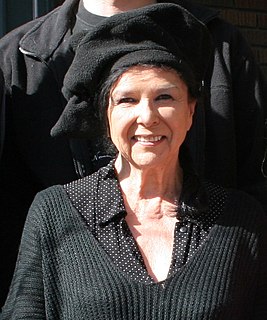A Quote by Susan Hill
Certainly with a book, people are going to be able to read it and give themselves permission to have that delicious feeling of being terrified because they're in a safe place while they're reading. That's what you can rely on as a writer, that people can let themselves be really frightened because they're really all right.
Related Quotes
Certainly with a book, people are going to be able to read it and give themselves permission to have that delicious feeling of being terrified because they're in a safe place while they're reading. That's what you can rely on as a writer, that people can let themselves be really frightened because they're really all right. Being frightened when you're not sure you're all right is a big difference.
I began writing books after speaking for several years and I realize that when you have a written book people think that you're smarter than you really are if I can joke. But it's interesting. People will buy your book and hire you without reading the book just because you have a book and you have a book on a subject that they think is of interest to themselves or e to their company.
I feel very grateful that for some reason I was raised to believe that I had permission to explore the creative world. I'm very aware of what a privilege that is, because most people don't grant themselves that permission, and I really think that's the only thing that separates people that call themselves artists from the rest of the world. It's suspending self-judgment for long enough to do something expressive.
I'd be surprised if non-fiction writers hate to be interviewed. We all hate them, because there's really nothing to say except "Read the book." Right? At least with non-fiction, you can kind of convey some information, and people can decide for themselves whether they want more of that kind of information. But with a novel, what am I going to do?
A writer writes a book. People read it. You don't know what they're reading, really. You read a review and think, "That is so inaccurate. You can't have been reading my book with any kind of attention, because that is all wrong, that's even the wrong name you're including there." But these reviewers have been diminished in importance, the work is so little respected. If you're reviewed by a real critic, by James Wood or Louis Menand, then you get something that is informed, interesting, and highly articulate. But the average review doesn't have that kind of depth anymore.
I do find that people are incredibly naive about what it is to be a writer. Like you would pay an incredible amount of money for an MFA program and still not have the slightest idea of how one goes about becoming a writer. So, I'm always flabbergasted when people say, "Oh, I was invited to do a reading, but I'm not going to read because I don't have a book.".
I think the characteristics of really effective leaders when people are frightened and depressed are the same qualities that leaders need when people are optimistic. The difference is when people are frightened the need for these few qualities becomes much stronger because frightened people are desperate to have someone they can trust and believe in and who seems to be able to create a better future.
People are terrified of other people or difficult projects because they tell themselves that they could fail or be rejected. Failure can lead to sorrow, regret, frustration and annoyance - all healthy, negative feelings without which people couldn't exist. But then they add, "I absolutely must succeed and must be loved by significant persons, and if I don't, it's terrible and I'm no good." Those are irrational beliefs. As long as people keep them, they'll be terrified of life and will put themselves down when they get rejected.
I'm always trying to tell fans to love themselves. I see them going through a ton of hardships on Twitter and being bullied. It's really important and easier said than done to take care of yourself. A lot of people put themselves out for others and don't really think about mending themselves. Sometimes, they get a little lost that way.
Documentary film is the one place that our people can speak for themselves. I feel that the documentaries that I've been working on have been very valuable for the people, for our people to look at ourselves, at the situations, really facing it, and through that being able to make changes that really count for the future of our children to come.
A book is something that young readers can experience on their own time. They decide when to turn the page. They'll put their arm right on the page so you can't turn it because they're not ready to go to the next page yet. They just want to look at it again, or they want to read the book over and over because they really enjoy setting the pace themselves.
































